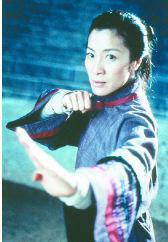THE SHARPEST SWORD can’t cut as deep as love, a theme that Ang Lee’s action-filled period romance illustrates in bold, brilliant strokes. It might seem a departure for the director of Sense and Sensibility and The Ice Storm to embrace swordplay and acrobatic stunts, but Lee infuses Tiger with pent-up feeling that, in its quieter moments, links the film to Jane Austen and Rick Moody. His source material is hardly so literary, being a ’30s serial novel that’s part pulp fiction, part comic book. Tiger‘s story takes place in a kind of Arthurian past, historical and mythical, set in what Chinese call the Giang Hu world, where samurai-like figures barter their fighting skills in a market of constantly shifting allegiances.
CROUCHING TIGER, HIDDEN DRAGON
directed by Ang Lee with Chow Yun Fat, Michelle Yeoh, and Zhang Ziyi opens December 22 at Neptune and Uptown Cinemas
It’s also a magical world, where the rules of ordinary physics don’t apply, but Lee doesn’t immediately signal this suspension. Tiger begins with Master Li (Chow Yun Fat) deciding to retire from his trade as a roving martial arts warrior. Like an old gunslinger’s hanging up his irons, Li’s decision to pursue a peaceful, contemplative life triggers a crisis that can be resolved only with violence.
Traveling to Beijing with a precious 400-year-old sword, he encounters his old flame Shu Lien (Michelle Yeoh), who also knows how to handle herself in a fight. After they arrive in the imperial city, the blade is promptly stolen, and suspicion turns to Jade Fox, Li’s mysterious, ninja-like nemesis. Shu Lien and Li join forces to find the sword, making Tiger a detective movie as well as a love story.
THEN LEE SENDS Tiger leaping in an exhilarating direction. In the moonlight, Shu Lien pursues a lithe, masked, suspicious figure. The two begin sparring and chasing, running up walls and springing across rooftops, their lunar shadows cast heroically large across the tiles and cobblestones. Their hands and feet moving with impossible speed and precision (yet punctuated by sudden pauses), the pair brawls with superhuman intensity to the accompaniment of pounding drums. (Thanks to The Matrix choreographer Yuen Wo-Ping, all Tiger‘s fight sequences are equally enthralling.) Just before her quarry escapes, Shu Lien makes eye contact. Is it Jade Fox?
Meanwhile, nearby, a rich merchant’s pampered daughter, Jen, dreads her arranged marriage. Played by lovely Zhang Ziyi, she laments, “I’m bored,” to Shu Lien when they meet, envying the older woman’s freedom (she runs her own security business). Shu Lien initially appraises Jen as a rival for Master Li’s affection, and both women express that competition through their martial arts skills. In its one purple patch, Tiger jarringly interrupts this love triangle with an overlong second act flashback—like some overheated Harlequin romance—recounting Jen’s past adventures in China’s western desert.
For all its plot twists and action set pieces, Tiger has more on its mind than Saturday matinee thrills. There’s “no desire without restraint,” says Master Li, an axiom that challenges Jen and Shu Lien in different ways. They’re both drawn to the man— unsurprising, since Chow brings to his character the same grave charisma he showed in Anna and the King and John Woo’s Hard-Boiled. Big-eyed Yeoh is no less magnetic, projecting a kind of tough-moll capability we associate with ’40s movie heroines. Best known for Jackie Chan movies and the Bond flick Tomorrow Never Dies, she likewise communicates a grown-up sense of longing, especially when her frustrated Shu Lien reproaches the ascetic Li, “Not everything is an illusion.”
In other words, even as Tiger builds to its amazing bamboo-swaying showdown, the real battle is between the heart and the flesh, the eternal and the present, philosophy and passion. This grand, sweeping movie manages to resolve all these conflicts in a manner that makes it one of the finest pictures this year. Its ending feels true to both the spirit of the Giang Hu never-never land and our own modern sensibilities—which is exactly what myths are for.








